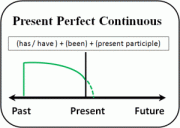 This post will show you how to use the Present Perfect Progressive. To see how to form the Present Perfect Progressive, click here.
This post will show you how to use the Present Perfect Progressive. To see how to form the Present Perfect Progressive, click here.
The Present Perfect Progressive, also called the Present Perfect Continuous, is used with continuing activities. We often use since and for with this verb tense.
- My English has been improving lately.
- I have been living in Vancouver for six months.
- They have been studying English since January.
- It has been raining since Monday.
- She has not (hasn’t) been exercising since she hurt her back.
- How long have you been going to the new Conversation Club for?
- Who have you been talking to for hours?
.
The Present Perfect Progressive is also used for activities that were in progress, but have just ended.
- It’s finally done! I’ve been writing this essay all month!
- He has been working all day so he is very tired.
- You have been sleeping for ten hours!
.
We also use the Present Perfect Progressive to make excuses with an apology.
- I’m sorry I haven’t called you, I haven’t been feeling well lately.
- I’m sorry I didn’t go grocery shopping, I have been working too much these days.
.
Some common verbs can be used in the Present Perfect or the Present Perfect Progressive with no difference in meaning. Some of these verbs are live, teach, wear, work, study, stay, and feel.
- Mr. Rodriguez has lived here since 2010.
- Mr. Rodriguez has been living here for three years.
- He has taught Spanish for a long time.
- He has been teaching Spanish for a long time.
- He has worn the same jacket for years.
- He has been wearing the same jacket for years.
.
Sometimes, using the Progressive tense can show a more intense feeling.
- I’ve waited for an hour.
- I’ve been waiting for an hour. (I am very annoyed)
- I’ve thought about this for days.
- I’ve been thinking about this for days. (I can’t stop thinking about it)
.
While the Present Perfect can express a completed activity that may or may not have been recent, the Present Perfect Progressive shows that an activity is continuing up to the present time, or was very recently completed.
- I’ve read a book about psychology. (I finished it at some indefinite time in the past)
- I’ve been reading a book about psychology. (I’m not finished. Or I’ve just finished it)
.
Usually, we do not use the Present Perfect Continuous when we say how many times an activity has been repeated.
✔ I’ve watered the garden three times.
✘ I’ve been watering the garden three times.
